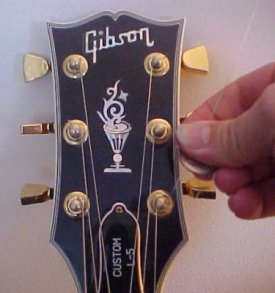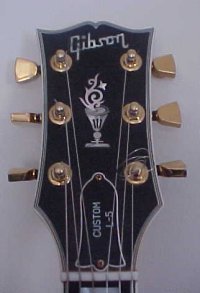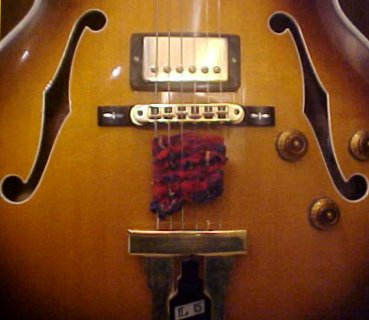
|
Miscellaneous Tips |
![]()
Broken String on the Gig?
Here's a cute trick to try when you break a string on the gig. After you slam a new string on, you always have that couple inches hanging off the tuning peg that gets in the way and pokes your eye.
 |
 |
To deal with it temporarily, take a coin and tightly pinch the string between your thumb and the coin. Then slide the coin up the string, applying pressure with the coin. This will make the string curl up into a tight little ball and keep it out of the way until you can snip it.
Flying With Your Guitar
I use a Mark Leaf case (http://www.markleaf.com). It is built like a tank and is waterproof and airtight. It is great for checking guitars like a Gibson L5. If I have to travel with more than one instrument, I'll check one in the Leaf case and carry another on.
The best trick I've found for carrying instruments on is to use a shoulder strap on the case. If the strap connects to the sides of the case, (one by the neck, and one by the lower bout), you can hang the guitar along the side of your body. As you approach the ticket agent, hang the guitar on the side of your body away from the ticket agent. The guitar will be almost invisible to them, and you can slip right on the plane.
 |
 |
| Here's a guy carrying a great big guitar. "Sir, that guitar will not fit into the overhead bins." | This guy is carrying the same guitar, but now it doesn't look so big. |
One thing you do not want to do is to discuss the matter ahead of time with the ticket agents where the baggage is checked. They will insist that you check it. If you wait until everyone is boarding, the gate agent, who is facing a long line of customers, is much more likely to let you by rather than cause a scene.
Note that it does not always work. Some agents will flatly refuse to let you carry your guitar on. In those cases, you will "gate check" it. Baggage that is gate checked will be handled a bit more gingerly than baggage that is checked at the main baggage check point. If you have to gate check it, loosen the strings a bit before turning it over to the gorillas.
Ringing Strings
On my archtop, the portion of the strings between the bridge and the tailpiece ring, and this causes the pitches to not ring quite as true as they could. To stop this, I use a long piece of my wife's old flannel nightie, and weave it into the strings (over one, under the next, etc.)

It stops that ringing quite well. And my wife likes it too, because it scent marks me as hers when I'm playing on stage.
Strings Dying Too Fast?
Some of us can kill a set of strings very quickly. My skin is so oily that I can wring the life out of a set of strings in a day or two if I am careless.
The solution to this problem is surprisingly easy. Actually, it's so easy, you'll probably dismiss it as something that won't work. Just wash your hands before you play, and wipe your strings every time you finish playing. If you're going to play for several hours, wash your hands a couple times during the session, and also wipe the strings a couple times. I used to kill a set of strings in a matter of days, but now can get 2-3 good weeks from them.
Raise That Action!
Raising the action of the strings gives you several advantages as a player.
One of the biggest advantages of a higher action is the added dynamic range that it gives you. The higher the action (to a certain point, of course), the greater the dynamic range of the instrument. This means that given a certain volume on the amp, you can produce a wider range of volumes (from very soft to very loud) just by striking the strings differently.
You'll find that as you explore this greater dynamic range, you can develop a range of widely varying sounds from the instrument itself. These sounds from the instrument can be combined with changes in the volume of the amp to produce different sounds from the amp.
For example, suppose you are playing a line over rhythm changes at a "normal" volume, and the muse of music whispers into your ear "surprise them". You finger an octave A, and strike the strings forcefully. If your action is low, you will produce a buzzing, ugly sound. With a higher action, your octave A will have a powerful sound.
Some experimentation with combinations of how hard you strike the strings, where you strike the strings, and how loud the amp is (a volume pedal is always handy), will show you that there is a world of sound in the guitar itself.
Do it long enough, and you'll feel less and less need to use effects to get a good sound.
A Suggestion for Memorizing Music
First, learn the piece to the point where you can play it all the way through without mistakes (or at least without major halts) while reading the music.
Then record the piece on any tape recorder. Get someone to turn pages for you if need be while you record it.
Put on a pair of headphones (you may want to have one headphone on and one off) and play the tape of the piece you just recorded. Close your music and play along. Repeat, repeat, repeat.
This forces you to conceive of the music as a continuous flow. It allows your mind to absorb the pitches and the motions all at once in real time. You may also want to record the piece well under tempo and play along.
© 2002 - 2016, Tim Berens
All rights reserved